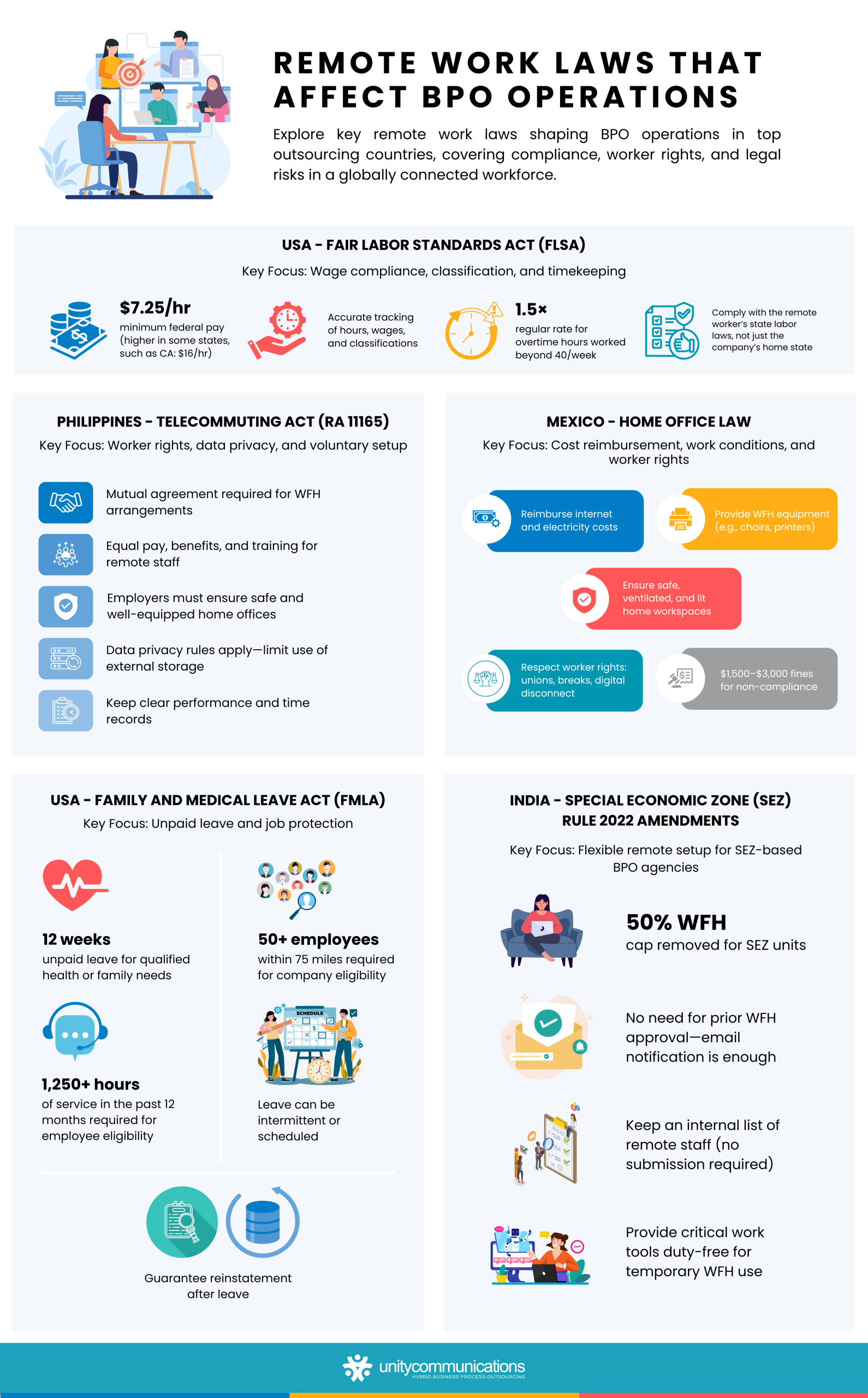IN THIS ARTICLE
Table of Contents
The COVID-19 pandemic has changed modern work trends. Many employees prefer job flexibility, with recent research confirming that 62% would even accept a 10% salary deduction in exchange for remote roles.
While remote employment has benefited workers in different ways, some employers have to scratch their heads. After all, who would not find it perplexing when some employees take the out-of-office arrangement as an out-of-town opportunity?
Business process outsourcing (BPO) companies must strategize to maximize remote work’s advantages and avoid such issues. The first step is to comply with the remote work laws discussed below.
Remote work laws that affect BPO operations

Since the pandemic hit, remote working environments have consistently been touted for their flexibility. According to Owl Labs’ 2023 data, employees feel more productive, balanced, and loyal to their companies because of it. Hence, 62% would take a 10% pay cut to achieve this job advantage.
However, remote jobs also have their downsides. Recent statistics show that fully remote employees are 10% less productive than those working in the office. They are more distracted or demotivated. Some even take this opportunity to do workcations or hush trips.
BPO companies optimize the setup’s advantages and minimize disadvantages by understanding and adhering to remote work laws. They integrate their teleworking strategies with rules and regulations, such as the examples from outsourcing hotspots below.
United States Fair Labor Standards Act (FLSA)
The FLSA covers all remote workers in the public and private sectors, including the BPO industry. Employers must abide by the listed standards under the FLSA, which the Department of Labor has implemented:
- Pay employees working from home at least the federal minimum wage of $7.25 per hour. However, this amount varies by state. For example, in California, it’s $16; in D.C., it’s $17.
- Compensate eligible employees with 1.5x the regular rate for hours worked beyond 40 hours in a workweek.
- Maintain accurate recordkeeping of working hours, wages, and other essential employment details.
- Align timekeeping systems and recordkeeping practices with FLSA standards to avoid legal repercussions.
- Correctly classify employees working remotely into two categories: exempt and non-exempt. Exempt workers are not eligible for overtime pay, while non-exempt ones are.
This federal law is the umbrella labor rule for the entire U.S. However, regulations for remote work still vary across states. For instance, suppose a business in Arizona employs remote workers from Chicago. The Arizona-registered company would have to adhere to the Illinois labor policy for those employees.
Philippine Telecommuting Act
The Telecommuting Act of 2019, otherwise known as Republic Act No. 11165, governs remote work that uses telecommunication and computer technologies in the Philippines. This law highlights fair treatment and data privacy when adopting work-from-home (WFH) arrangements.
The key points below are what the country’s BPO industry must observe when implementing remote or hybrid work models:
- Telecommuting is voluntary. Both employers and employees must agree to a remote work arrangement. They should mutually consent to the setup’s terms and conditions, including overtime payments, night shift differential rates, and related allowances.
- WFH settings must comply with existing labor standards. This BPO-related remote work law requires employers to pay their employees a minimum wage. Telecommuting workers shall experience compensation and training benefits similar to those of their office-based counterparts.
- Remote BPO workers must have safe and comfortable home offices. Providers need to confirm whether their employees have an efficient working environment at home. The law also directs employers to provide necessary office equipment.
- Firms must strengthen data privacy and security for telecommuting. Employers and employees must abide by the law’s data protection standards. Measures may include restricting their WFH staff’s use of external cloud-based storage.
- Employers should track work performance. Proper record-keeping of telecommuting hours and tasks is crucial for maintaining productivity and accountability. Providers should ensure workers accomplish their responsibilities effectively while at home.
- The remote workforce shall receive government and employment benefits. These include social security, health insurance, paid leaves, and other incentives. Employers must ensure that WFH staff receive equal compensation packages.
Note that this remote labor law‘s provisions will not mandatorily apply to a telecommuting arrangement if neither the employer nor the employee agrees to one. The act might not cover manual laborers working remotely without using telecommunications and computer technologies.
Mexico’s “Home Office Law”
According to the country’s updated remote work law, employers—including those in the BPO sector—must pay for employees’ related expenses. Laborers who spend over 40% of their workweek at home or another out-of-office location are eligible for this benefit.
Mexico’s Labor Ministry will charge between $1,500 and $30,000 in fines when companies fail to comply with these home office regulations:
- Reimburse a portion of remote workers’ internet and electricity bills.
- Provide work equipment for home use, such as ergonomic chairs, desks, and printers.
- Confirm whether the remote work locations are safe, adequately ventilated, and lit.
- Respect the rights of remote employees to join a union or connect with colleagues.
- Set up effective and user-friendly platforms for virtual communication and collaboration.
- Value standard work hours in relation to workers’ “right to disconnect.”
- Implement special protections for employees who might encounter domestic violence.
- Acknowledge nursing mothers’ right to take a break to feed their children.
United States Family and Medical Leave Act (FMLA)
Remote BPO employees who are eligible under the FMLA are entitled to a maximum of 12 weeks of unpaid leave per year without concern for their job security. As long as their companies consist of 50 or more workers within 75 miles, they can take advantage of this benefit for family and medical purposes.
Besides the minimum workforce requirement, an employee must have worked for the BPO employer for at least 12 months, or 1,250 hours over the past year. They can acquire leave for the following qualifying reasons:
- Birth and care of a newborn child or pregnancy complications
- Placement of a child for adoption or foster care
- Care for an immediate family member with a severe health condition
- Serious health condition
- Military family exigency
Similar to those working on-site, remote BPO workers can take FMLA leave intermittently or on a reduced schedule if necessary. They can use the leave in separate blocks or decrease the number of hours worked per day or week.
The law requires remote BPO employees to provide their employers with a notice and medical certification to prove the need for leave. When the workers return, the employer must reinstate them to their original roles with equivalent compensation and employment terms.
India’s amended Special Economic Zone (SEZ) rules
The Indian government revised its SEZ rules in December 2022. The amendment was meant to relax the WFH guidelines for employees working in SEZ units. The enumerated changes also impact BPO offshore centers operating within SEZs.
- Remove the 50% cap on the number of employees allowed to work remotely.
- Eliminate the need to seek WFH permission from the Development Commissioner.
- Email the Development Commissioner as a notification for the WFH commencement instead of requesting authorization.
- Abolish the need to submit the names of remote workers to the Development Commissioner.
- Maintain a list of those names instead and make it accessible to the Development Commissioner whenever necessary.
- Provide the remote staff with critical work equipment temporarily without requiring payment of any duty or tax.
2025 legal trends impacting BPO remote work rules

According to recent reports, 64% of global executives believe full in-office work will return in 2026. Meanwhile, other research states that most workers do not entirely want to return to on-site jobs. They seek flexibility when applying for various roles or staying with their employers.
While many businesses highlight WFH to attract and retain talent, they have to consider the latest legal trends to ensure the smooth implementation of remote work. The regulatory shifts below are what BPO companies should note when expanding this employment setup:
- Governments continue to refine regulations as businesses continue to adopt off-site employment. BPO organizations should adjust their remote work arrangements based on updated compensation, tax, and cross-border employment laws.
- With the increasing reliance on remote work, governments constantly enhance their data and privacy security rules. Because they deal with sensitive information, BPO firms must stay abreast of any changes in remote work laws and requirements.
- As employers increasingly combine remote and on-site work, the legal landscape also evolves to accommodate and regulate this hybrid model. Updates in company and government regulations should address hybrid work issues, such as scheduling, compensation, and employee rights.
- Recent legal trends consistently emphasize the importance of mental health and well-being in remote workplaces. BPO providers need to understand and implement program improvements for remote workers’ mental and physical health.
- BPO companies continue to enhance their systems to meet the growing demand for fast-paced support services. Legal trends, however, require them to ensure their remote work technologies comply with security standards. They must invest in protected and compliant tools to safeguard data and maintain regulatory compliance.
- Legal discussions around employee classification, specifically in the context of gig work or freelancing, may impact how BPO companies structure their remote workforce. Regulatory changes governing independent contractors could influence BPO operations.
The bottom line

Out-of-office jobs are here to stay. However, despite their many benefits, BPO firms must still endeavor to avoid related challenges. Understanding and abiding by remote work laws are among the crucial steps in maximizing the advantage of this employment model.
The legal frameworks discussed help third-party vendors structure their remote work policies, address labor issues, and protect employee rights. The latest legal trends further guide them in improving these critical rules and regulations.
If you seek a BPO partner with efficient remote work strategies and compliance methods, let’s connect and negotiate a possible agreement. Unity Communications adheres to crucial laws while ensuring its remote workforce delivers high-quality output for your business needs.





